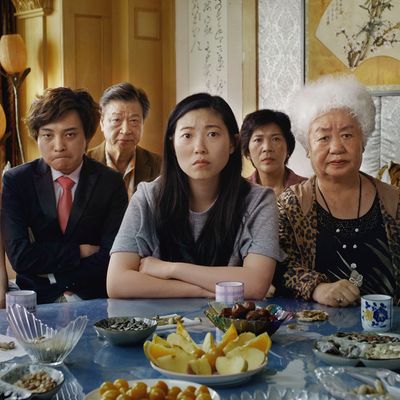
This review was originally published during 2019’s Sundance Film Festival. We are republishing the piece as the film hits theaters this weekend.
“Chinese people have a saying: When people get cancer, they die.” These are the words of wisdom imparted to Brooklyn twentysomething Billi (Awkwafina) by her mother while delivering the news of her beloved grandma Nai Nai’s lung cancer diagnosis. They’re clearly little comfort, but also prove to be anything but reliable in the turn of events that follows.
The Farewell, based on writer-director Lulu Wang’s own stranger-than-fiction true family story, was previously featured on the 2016 This American Life episode “In Defense of Ignorance.” But no podcast could have prepared anyone for the sophistication of Wang’s talents as a filmmaker, and in this, her second feature, she transcends the hooky premise with confidence and subtlety. The little dramas and themes that emerge during the reunion of the film’s far-flung brood become, like a family, more than the sum of its individual parts, and an incredibly satisfying meal of a film.
The film opens with a phone conversation that spans half the globe and all the living generations of a family. Billi walks the bustling streets of Manhattan chatting with Nai Nai (the charmingly zingy Shuzhen Zhou), who waits at the doctor’s office for an MRI. She’s accompanied by her sister Little Nai Nai (Lu Hong) who gets the news of the diagnosis first. Since Chinese law doesn’t require doctors to disclose diagnoses to patients, Little Nai Nai doesn’t tell her sister, the matriarch of the family, that she has inoperable stage four lung cancer. (It’s a move we are told isn’t all that uncommon in Chinese families.) Instead, she tells the rest of the family, and soon a wedding has been orchestrated between Billi’s cousin Hao Hao (Han Chen) and his Japanese girlfriend Aiko (Aoi Mizuhara) as a means of getting the entire family back to Changchun.
Billi’s parents (played by the excellent Diana Lin and Tzi Ma) assure her she doesn’t need to make the trip — that she’s too American and emotionally transparent, and won’t be able to keep up the familywide ruse. But we’ve already seen Billi on the phone with her grandmother, and we know they have a bond, if a somewhat abstract, long-distance one. With her professional prospects in New York faltering, she makes the trip back to the town she spent her early childhood in.
Going back to a homeland that doesn’t quite feel like home is the foundational melancholy of The Farewell. The neighborhood Billi grew up in is demolished and unrecognizable, replaced by rows of identical apartment towers; she and the rest of her family stay in a slightly dodgy hotel. Billi isn’t the only other “foreigner” in the family; her uncle and cousin moved to Japan so long ago that Hao Hao barely speaks Chinese anymore. His bride-to-be Aiko speaks none, and doesn’t seem to know exactly why she’s marrying her boyfriend of three months, something the Wang gets a lot of wry comic mileage out of.
The fact that The Farewell is such a frequently and easily funny film, on top of the heavy stuff it’s dealing with, is what makes it feel so miraculous. Awkwafina’s comic timing comes in handy, Wang using it in just the right moments to emphasize her unmistakable American-ness. But The Farewell is also just about how being a part of a family is inherently funny, and not in a Meet The Fockers way — that humans are weird without trying to be and you’re most likely to get a glimpse of that when you’re related to them. Billi’s family aren’t exactly bickerers, but they’re all trying to figure each other out, having spent so much time apart. Wang counterpoints conversations over action with graceful intuition; there’s always something going on in the background that adds a new shade to whatever is being said. Cinematographer Anna Solano’s soft palette guides us through the layers of human interaction, whether in a tiny cramped living room or a sprawling banquet hall.
The narrative and visual thread that runs through The Farewell is collectivism, a particularly eastern concept that immigrant kids tend to have to relearn at some point in their lives. “You think one’s life belongs to one’s self,” Billi’s uncle says when she hits a breaking point with the big lie. Over and over again, everyone in the film realizes the satisfaction that comes from being part of a shared consciousness, and the pain of being cut out of it. As the film reaches its third-act centerpiece, the much-anticipated wedding itself, it’s clear that one “big” lie allowed some larger truths the space to show themselves. Wang’s ability to bring it all together feels both like the work of a seasoned auteur some 40 films into her career, and a very exciting arrival.

